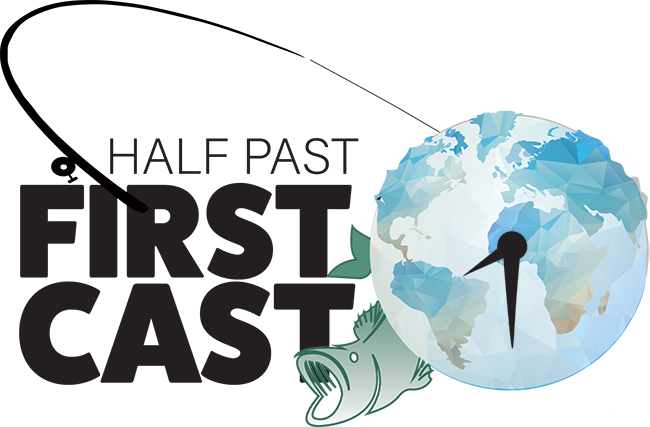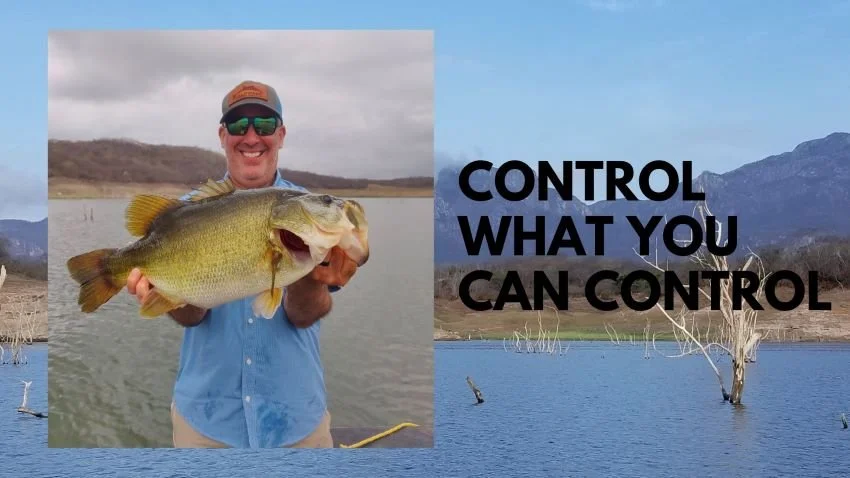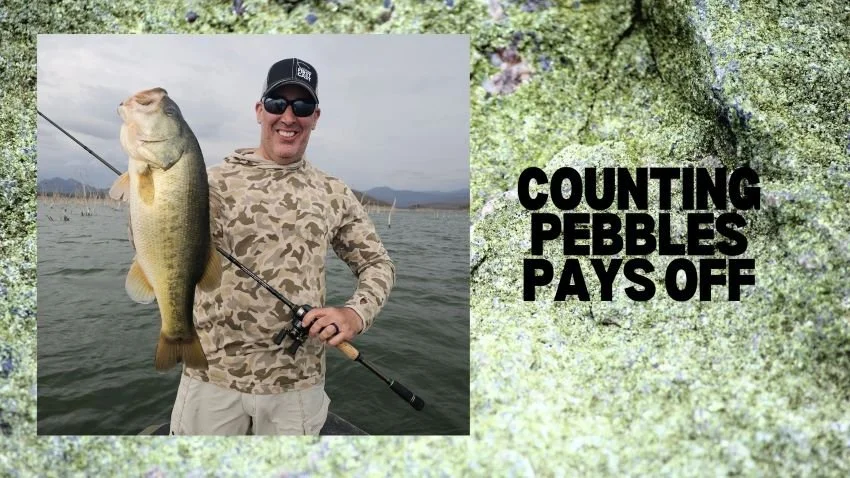Losing Control and Becoming a Better Angler at El Salto
I’ve been to Anglers Inn properties at Lake El Salto and Lake Picachos with a number of tour-level anglers. Most of them have trouble with the program – specifically a guide choosing the spots, how long you stay there, and controlling the boat’s movement while fishing. For people used to controlling every controllable aspect of their on-the-water destiny, it’s tough to give up that amount of autonomy.
I’m certainly not a pro, but I can relate. Any time I’m on the water and someone else is making the major decisions, it can cause my head to spin. They’re going too fast or too slow. They’re staying in one spot too long. Or their position is just a bit off. It can be maddening – particularly if the fishing is slower than you’d like.
That sometimes leads me to a mental trap. On our most recent trip to El Salto, I felt myself headed that way. My guide fished areas I didn’t like, or stayed in areas too long, and I found myself getting agitated. Here’s the counteractive strategy I took:
“Bad Areas” – I’m often reminded of something Rick Clunn told me at the 2005 Bassmaster Classic in Pittsburgh. Paraphrasing, he said that as we drive down a body of water we subconsciously refer to spots as “good” or “bad” and then that determines how we fish them, or whether we fish them at all. That kind of reflexive thinking is dangerous, he implied, because we prejudge a situation before assessing the conditions at hand.
Our regular guide at El Salto has an area that he likes during the low water months. It’s not a secret, but my initial analysis was that it can’t be good. He’ll spend some time there every session and occasionally it pays off – like when our friend Paul Fisler caught his 10.44 lb. PB there in 2023. Even after that, I had a bad attitude about it. I’d occasionally catch a decent fish there, I still didn’t like it.
This time I started to think about why I didn’t like the area. Part of the reason, I deduced, is its location, near the ramp. Our guide often makes his longest run to start a fishing session, and then hopscotches his way back. The arrival at the spot in question is often a sign that our fishing session is almost over. I don’t like it when fishing is done – thus the negative connotation with this area. Just by realizing that, it helped me to counteract some of that negativity. I’ll never like ending the session, but by focusing on the reasons why the area produces rather than my mixed history there, I was able to fish it more assertively and confidently.
Staying Too Long – One of the other gripes I sometimes have with the guides is that they stay in a particular spot too long. I am naturally impatient. Furthermore, my general belief is that on such a fertile lake like El Salto, with so many big bass, they should be biting somewhere all the time. It gets frustrating to sit in a spot waiting for something to happen when you’re abso-damn-lutely certain that you get be getting it done somewhere else.
But here’s the little secret – in most cases, they know better than you do. If they’re hanging around what seems like a barren area for an excessive amount of time it’s because they think it holds big fish. More than any other lake I’ve ever fished, El Salto in particular is a matter of timing. A short bit too soon or too late can mean a world of difference. This is their livelihood and they depend on tips – believe me, if they thought things would be better across the pond they’d be moving there immediately.
That doesn’t mean that you shouldn’t ask them to move, or for one more cast, but as a general rule over time it pays to heed their instincts.
So What’s the Strategy? – As I thought about how to deal with the occasional frustration that creeps into my brain, I came up with a solution. I’d already relinquished control of boat location and boat position (as well as the duration in that location) to the guide, so I had to focus on the things that were still within my control. Those included not just lure choice, but every aspect and every moment of the cast.
It's actually a huge advantage. I found myself able to be more present in each cast, focusing on what my lure was doing, what I was feeling, the exact speed or cadence, and what was happening when I got the bite. You can only have one cast at a time, and I was able to devote my full energies to the details of that particular presentation.
The Poker Analogy – Perhaps not coincidentally, on the flights to Mazatlán, I read Maria Konnikova’s “The Biggest Bluff: How I Learned to Pay Attention, Master Myself, and Win.” The author, a complete poker novice, enlisted a variety of skilled and experienced mentors to help her become a skilled player in the course of a year.
I still don’t know much about poker, but of the many lessons I took away from the book involves the fact that you can’t control the cards you receive. Yes, there are bad beats and seemingly impossibly good runs, but over time things even out. More importantly, it comes down not just to the cards you are dealt, but how you deal with them. The result is that some of a poker player’s greatest victories occur when he or she has what are objectively terrible cards, and some of his or her greatest failures occur with otherwise strong hands.
So even if you think that your guide or fishing partner has led you to an imperfect or less-than-desirable situation, if you’re still going to make a cast, make the most of it. Otherwise you might as well fold (i.e., go back to the lodge and drink margaritas).
It’s Like Weightlifting, Too – My weightlifting knowledge is about equal to my poker knowledge, but indulge me here. That sport applies to fishing, too. In particular, think about how specific muscles and muscle groups are enhanced. Athletes isolate them and use exercises specifically tailored to a particular region or location. Sure there are moves that help multiple muscles, but the hard and meaningful finishing work comes in something that isolates your biceps or glutes or some other domain.
Again, if you’re thinking about running the trolling motor, or what your electronics are telling you, or what weather system will arrive in an hour, that’s energy that can’t be devoted to being fully present in your cast. On tournament day, it will of course be valuable to do all of those things at once, but you can get there faster by working on one of them at a time.
That’s the lesson I took away from this trip. I can go to a wonderland of big bass and be frustrated that everything isn’t exactly as I want it to be, or within my control, or else I can see that as an advantage. I can put every ounce of effort I can muster into understanding my particular cast. That could be “counting pebbles” with a worm or timing the length of a crankbait pause to get in more casts and more fish in the boat.
The best anglers I’ve ever met are the ones who can check their egos at the door when it’s appropriate to do so, and I also realized that part of my frustration was born of ego. I consider myself a fairly educated bass angler, and it’s hard to relinquish any amount of control. And yet by giving some of it up, my results got better as the week went on. Remaining fully invested in each cast isn’t possible, but the more I hone the skill, the more it’s likely to become a part of my muscle memory.






